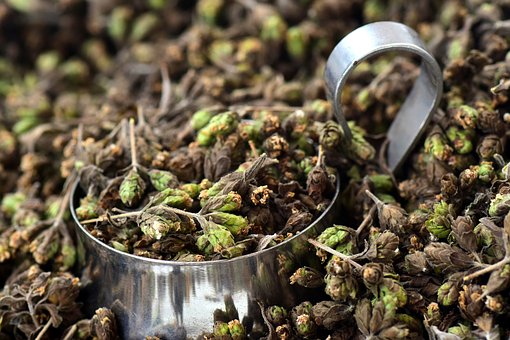Ibn al-Qayyim: Marjoram is Beneficial for Headaches, Inflammations and Pain Relief

- Sniffing the herb is beneficial for a headache as the result of a cold;
- It is beneficial for most inflammations;
- It opens up obstructions in the head and nostrils;
- Its oil is beneficial for pains of the back and knees, and it dispels fatigue.
Marjoram (botanical name Origanum marjorana) is also called Sweet marjoram or Majorana hortensis. It is a herb whose leaves, seeds or flowers are used for flavoring food or medicine. Its leaves are aromatic and can be used fresh or dry.
There is another plant in the same family as marjoram (Origanum) known as Wild marjoram (Origanum vulgare). This herb is commonly known as oregano and should not be confused with the herb marjoram. Oregano is far less fragrant than marjoram, but both herbs are packed with antioxidants, more so in their fresh form than dried. Essential oil is made from marjoram leaves and is considered to be the most fragrant essential oil among all herbs. It has many therapeutic benefits such as providing relief for muscular aches, soothing the nerves, and reducing tension and stress.
The flavonoids found in marjoram oil are thought to have sedation qualities which can help to relieve insomnia, tension headaches and migraines.
Health Benefits
One study into the health benefits of marjoram found that it could improve symptoms of asthma sufferers:
"In conclusion, data suggests that administration of marjoram oil at a safe dose (two drops daily) was effective in improving the health and lung functions of adult patients with asthma."[1]
Wild marjoram, or oregano has shown to have numerous health benefits. It contains phenolic acids that have strong free-radical scavenging activity, and these can help prevent certain cancers from forming. Indian oregano was shown to have protective properties against radiation-induced DNA damage in animal cells. [2]
Another study showed the antibacterial properties of oregano oil, in which it caused damage to E.coli bacteria within one minute. [3]
Tips on Using Marjoram
- Fresh marjoram should have a strong, fragrant smell and bright leaves and can be kept in the refrigerator for a few days.
- Marjoram can be chopped fresh or dried and used to flavor many dishes.
- The leaves and flowers of marjoram can be brewed in hot water to make a warming and soothing herbal tea.
- Marjoram works well in combination with other herbs and spices such as bay leaves, garlic, onion, thyme, and basil.
References
- [1] Mohamed S. Mohamed, Hisham H. Saad and Mai G. Abd El Khalek 2008 Daily Consumption of marjoram oil Improve the health Status of Patients with asthma. Pakistan Journal of nutrition 7 (2): 312-316.
- [2] Rao BS et al. antioxidant, anticlastogenic and radioprotective effect of Coleus aromaticus on Chinese hamster fibroblast cells (V79) exposed to gamma radiation. Mutagenesis. 2006 May 30.
- [3] Burt SA, Reinders RD. Antibacterial activity of selected plant essential oils against Escherichia coli 0157:H. Soc for Applied Microbio. 2003;36:162-167.
- Lin YT, Kwon Y1, Labbe RG, Shetty K. Inhibition of Helicobacter pylori and associated urease by oregano and cranberry phytochemical synergies. Appl Environ Microbiol. 2005Dec; 71(12):8558-8564.
- Shan B, Cai YZ, sun M, and Corke H. Antioxidant capacity of 26 spice extracts and characterization of their phenolic constitutes. JAgric Food Chem. 2005;53:7749-7759.
Link to this article: Show: HTML Link • Full Link • Short Link
Share or Bookmark this page: You will need to have an account with the selected service in order to post links or bookmark this page.





|
Related Articles:
Add a Comment
You must be registered and logged in to comment.
Most Popular
Latest Articles
Popular Subjects
Health, fitness and longevity
Based upon the principles of health
in the Qur'an and Prophetic Traditions.
HealthyMuslim.Com
There are two bounties in which
most people lose out: good health
and free time. Al-Bukhari.























